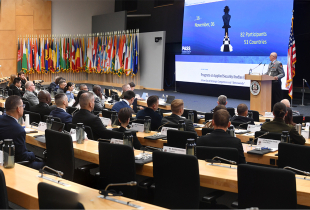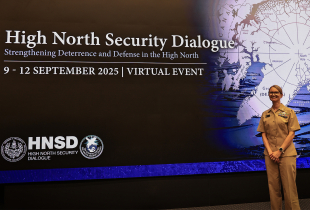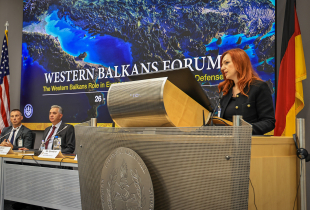
PASS 18-16 Participants Visit with the Garmisch-Partenkirchen Mayor
GARMISCH-PARTENKIRCHEN, Germany (Sept. 11, 2018) – Garmisch-Partenkirchen is known worldwide.
Not only because of the winter events and the beauty of the Werdenfelser Land, but also on the political level.
One reason for this is the worldwide unique George C. Marshall European Center for Security Studies, which has been based in this one of the busiest year-round holiday destinations in the Bavarian Alps since June 1993.
The German-American-led institute for security policy has been training government officials from around the world in seminars, forums and conferences on various security topics for a quarter of a century.
The aim of these courses in Garmisch-Partenkirchen is the international networking of government members, this is to support a cross-border cooperation of nations or even allow.
At the beginning of September, the Program on Applied Security Studies was launched. Program director of this prestigious course is German Army Col. Carsten Treder. The German army officer has been living in the market town since 2017 and was commissioned to lead the PASS course after several foreign assignments.
"The PASS course has been our flagship course at the center for more than 20 years. We are inviting more than 100 younger government representatives from more than 40 nations, all of whom are still at the beginning of their careers. We are giving them an overview of security policy in their countries and regions before they become decision-makers,” Treder said.
He emphasizes that this course is unique in the world. “The widest possible range of security policy topics are being taught in these 10 weeks,” he said.
The Mayor of Garmisch-Partenkirchen Sigrid Meierhofer recognizes the importance of the courses at the Marshall Center.
Every year, she invites participants from all around the world to the congress hall and informs them about how this market town has come to be and what conditions are needed to steer the future of this tiny town.
"I am convinced that the work of the Marshall Center is highly appreciated politically; otherwise, why would more than 150 nations send their people to Garmisch-Partenkirchen for the past 25 years,” she said. “Whenever I'm traveling, I am repeatedly refer to the Marshall Center, not only because of the G7 summit, which was held so peacefully in our district (in 2015), but also the center is very important because they represent a significant economic factor for our market community.”
After the presentation from the mayor, another special feature awaited the international students.
Professor Dr. Rudolf Faltermeier, president of the Association of the Friends of the Marshall Center, provided each interested student with a local family, who will sponsor them while they are here.
The aim of the association is to provide guests with a deeper insight into the country, and its people after work and on weekends.
"Through donations and the annual contributions of our 60 members, our association wants to enable visitors to participate in culture and sporting events, and then take home this impression of normal life in Bavaria and Germany," Faltermeier said. “The focus is more on joint activities such as shared walks or shared meals to get to know each other better and to have a lively cultural exchange."
There is not much time left for this cultural exchange because the PASS participants will be invited to visit Germany’s most important ministries and government officials in Berlin in early November.
"In the middle of November, everyone is flying back to their homelands and trying to apply the knowledge they have learned in their professions and to use the network built up here," explains Marshall Center’s German Deputy Director Brig. Gen. Johann Berger.
Talking about the importance of the Marshall Center, Berger said “ One or more students might be promoted to minister or decision maker, and then in his term of office, he can apply Western values in his homeland that we are trying to convey here.”


